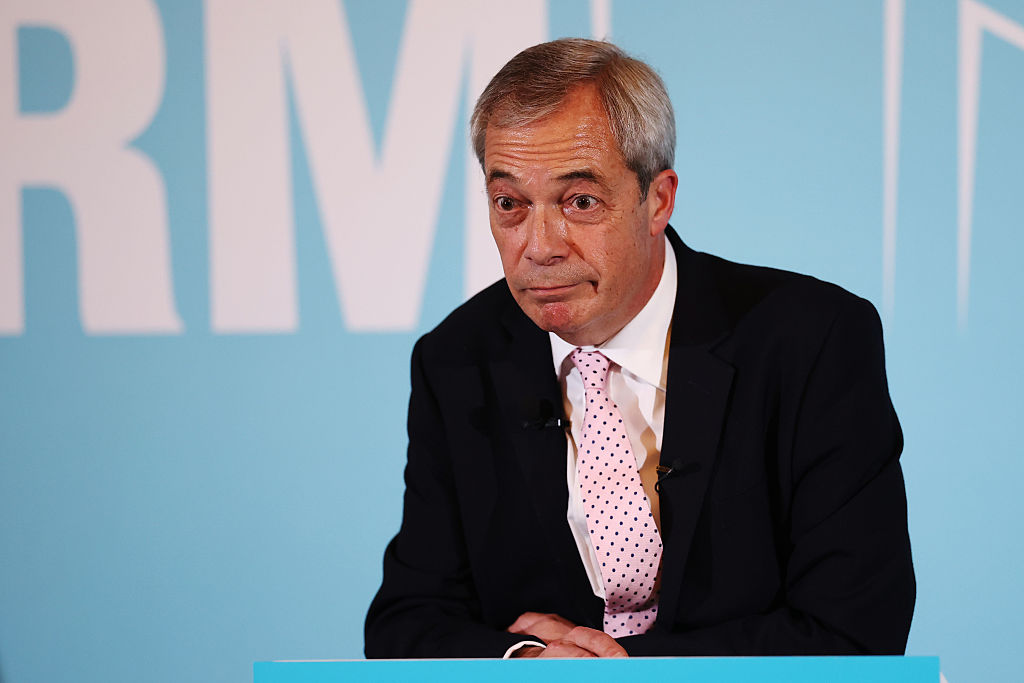
Louis Theroux: The Settlers was never likely to be a programme with much of a narrative arc – and so it proved. In the first 30 seconds, Louis put it to a Jewish householder on the West Bank that his house was ‘quite deep in what are called the Palestinian Territories’. ‘You call it the Palestinian Territories,’ the man replied. ‘I call it the heart of Judea.’
And that, on the whole, was that. Louis travelled from one Jewish settlement to another, doing his best to challenge the inhabitants with his faux-naif questions and impressive range of quizzical expressions. And yet, of course, none of them budged an inch. The only variety lay in how long they managed to speak in the patient tones of somebody explaining something obvious to a dimwit, before giving way to exasperation at Louis’s failure to realise how obvious it was. After all, the Jews have a literal divine right to this land, whereas the Palestinians have none.
At the centre of the programme was the ‘godmother of the settler movement’, Daniella Weiss, who’s helped to establish dozens of Jewish strongholds in the West Bank – and now has her sights set on Gaza. While still in patient mode, she told Louis that ‘we do for governments what they cannot do for themselves… Netanyahu is very happy at what we do but he cannot say it’. Moving on to exasperation, she dismissed Louis’s allegations of settler violence against Palestinians as ludicrously unfounded, even though there’s solid video evidence of it – and (a fact Louis curiously failed to mention) she’s been convicted of some herself.
In a programme called The Settlers, it’s perhaps fair enough that the focus should be so squarely on these people and their intransigence. Nonetheless, BBC sceptics will presumably have noticed how close Louis came to a simple tale of goodies and baddies, with the only Palestinians we met non-violent sweeties trying to go about their blameless daily business despite endless army checkpoints and constant petty humiliations.
Towards the end, too, Louis dropped his earlier pretence that he was merely there to ‘listen’, giving in to a fair bit of exasperation himself as he editorialised angrily about the indifference to Palestinian suffering and the assumption of Jewish superiority. He also suggested to Daniella that her keen embrace of both was ‘sociopathic’ – and that ‘when a people is put under occupation, anger is an appropriate response’.
Needless to say however, Daniella didn’t then furrow her brow and thoughtfully consider what he’d said; she just repeated yet again that she doesn’t ‘care about Palestinians, only Jews’. If you were being generous, you could perhaps argue that the pointlessness of questioning the settlers’ worldview was the rather depressing point of the programme. If you weren’t, it sometimes felt pretty pointless itself.
Happily, anyone who wanted to restore their faith in humanity after that – and who watches telly the old-school way – could change channels at the end for The Assembly on ITV1.
The result was a complete delight – an irresistibly warm watch: touching, revealing and often very funny
Last April the BBC broadcast a one-off version for Autism Awareness Week with Michael Sheen facing a ‘collective of autistic, neurodivergent and learning disabled interviewers’, where the main rule is ‘no question is out of bounds’. (Among those fielded by Sheen were ‘How does it feel to be dating someone who’s only five years older than your daughter?’ and ‘Do you know anything about Tom Jones, the long-term celebrity?’)
Now ITV has picked up the show for a series, which started last Saturday with Danny Dyer and continued the following night with David Tennant. The result in both cases was a complete delight – not just a patently Good Thing, but also an irresistibly warm watch: touching, revealing and often very funny.
Asked whether he’s pleased about his daughter’s forthcoming wedding, Dyer said he is – partly because she’s marrying the captain of West Ham, and partly because in the past ‘she’s brought home some twats’. After talking affectingly about his time in therapy, he led the group in a meditation exercise that, like many of the programme’s scenes, fulfilled a key requirement for a television show nowadays: it’ll make a great clip on social media.
On Sunday, like Sheen and Dyer before him, Tennant played a blinder, taking the serious questions seriously (‘Do you believe in God?’ was the opener) and throwing himself with relish into everything – including another highly meme-worthy moment when he performed an extract from Macbeth with a word-perfect neurodivergent Banquo. The programme finished with a joyous rendition of ‘Sunshine on Leith’ that brought tears to Tennant’s eyes – and I suspect, those of many viewers too.
And the end of his episode, the ever-sweary Dyer counselled the group to ‘prepare for fame, because I think this show’s going to be fucking massive’. It sounded like wise advice to me.








Comments